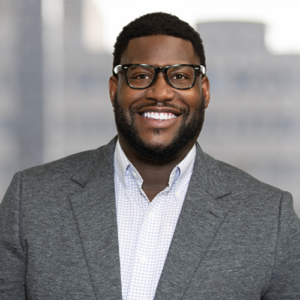Hall Render is proud to introduce the Black Health Care Executive Spotlight, a monthly series celebrating the achievements and contributions of Black leaders in the health care industry. Through interviews with executives from hospitals, health systems and other provider groups, the series aims to showcase the diverse perspectives shaping the future of health care.
This installment of Hall Render’s Black Health Care Executive Spotlight series features Willie Payton Jr., Chief Operating Officer at Abrazo West Campus. With a remarkable career dedicated to advancing health care operations and improving patient outcomes, Willie exemplifies leadership and innovation in the evolving health care landscape. Interviewed by Hall Render attorney Rubin Pusha, this spotlight dives into Willie’s journey, the impact of his work and his vision for the future of diversity, equity and inclusion in health care.
Interview
Q 1: What inspired you to pursue a career in health care?
A: Health care attracts people who are passionate about solving problems and embracing challenges, whether on the clinical or administrative side. For me, the foundation has always been about serving others—people who look like you and me, people who remind us of our family members. That sense of purpose is what keeps me engaged and committed to this work every day.
I’ve been fortunate to have incredible mentors and mentees who’ve shaped my journey. Mentors have opened doors for me, often when I least expected it, while mentees have offered fresh perspectives that helped me grow as a servant leader. I’m deeply grateful for everyone who has invested in my development and for the mutual exchange of knowledge and support that continues to drive my passion for health care.
Q 2: Why do you think having more Black professionals in the health care industry is important, particularly at the executive level?
A. Having more Black professionals at the executive level in health care is essential for modeling behavior and providing inspiration. Seeing someone with a shared background in a leadership role can help others envision their own potential and learn from those experiences. While not all mentors share the same identity, those who do often bring a deeper understanding of shared background or history and can offer candid feedback to help individuals grow and become the best leaders they can be.
Mentorship often falls into two categories: those who place you in opportunities and those who prepare you for them. The latter is especially important because without preparation, navigating new spaces—understanding the rules, politics and personalities at play—can be challenging. Proper guidance ensures individuals are ready to succeed and contribute effectively in leadership roles.
Q 3: How do you leave your mark and ensure diverse perspectives are incorporated into patient care delivery?
A. Improving patient care begins with perspective. Addressing health care disparities and social determinants of health requires diverse leadership at the executive and board levels. Leaders from varied backgrounds bring unique viewpoints to the table, helping shape operations and policies that reflect the needs of the communities they serve. Now you can start to plan and create the operations appropriate for managing the health services the way people want to receive them, and ensure that you’re creating true access where the rules and policies you’ve created aren’t a barrier to any individuals.
For example, accommodating family support during hospital stays, ensuring visitor policies are inclusive and allowing faith-based leaders to participate in the healing process are all critical to creating a supportive environment. These considerations remove barriers and ensure care is delivered in ways that align with patients’ values and needs.
As health care operators, the challenge is twofold: designing spaces for care and ensuring systems and processes support timely, effective delivery. Whether it is ensuring supplies are ready or preparing for emergencies, constant practice and preparation are essential to providing the highest level of care when it matters most.
Q 4: How do you see diversity, equity and inclusion shaping the future of health care?
A. Diversity, equity and inclusion are essential to improving health care by fostering environments where individuals can bring their authentic selves to work. When leaders and frontline staff from diverse backgrounds feel comfortable contributing, health care organizations achieve better outcomes by incorporating varied perspectives into patient care.
Additionally, addressing social determinants of health is critical. Every community faces unique challenges that affect overall health outcomes. By focusing on these factors and building operations that improve access, health care providers can better serve the diverse populations they live and work alongside, ensuring equitable care for all.
Practical Takeaways
- Willie Payton Jr. emphasizes the critical role of diversity in health care leadership. His career showcases the value of mentorship, particularly for Black professionals aspiring to executive roles, as it not only fosters personal growth but also inspires others.
- Diverse leadership brings unique perspectives that shape policies and patient care, particularly by addressing health care disparities and social determinants of health. Ensuring inclusivity in health care settings contributes to better patient outcomes.
- Engage with this important conversation on diversity in health care by reaching out to Rubin Pusha at rpusha@hallrender.com or Mayo Alao at malao@hallrender.com for more insights on fostering diversity and improving patient care in the industry.
About Willie Payton Jr.
 Willie Payton Jr. is an experienced Chief Operating Officer with 15 years of experience in both government and for-profit hospital operations. Originally, from Cleveland, Ohio, Willie earned his Bachelor of Arts in organizational communications and Master’s in Health Services Administration from Xavier University in Cincinnati, Ohio. Willie is a life member of Alpha Phi Alpha Fraternity Inc. and an active volunteer with the American College of Healthcare Executives (ACHE) and the National Association of Health Service Executives (NAHSE).
Willie Payton Jr. is an experienced Chief Operating Officer with 15 years of experience in both government and for-profit hospital operations. Originally, from Cleveland, Ohio, Willie earned his Bachelor of Arts in organizational communications and Master’s in Health Services Administration from Xavier University in Cincinnati, Ohio. Willie is a life member of Alpha Phi Alpha Fraternity Inc. and an active volunteer with the American College of Healthcare Executives (ACHE) and the National Association of Health Service Executives (NAHSE).
***
Hall Render blog posts and articles are intended for informational purposes only. For ethical reasons, Hall Render attorneys cannot—outside of an attorney-client relationship—answer specific questions that would be legal advice.


